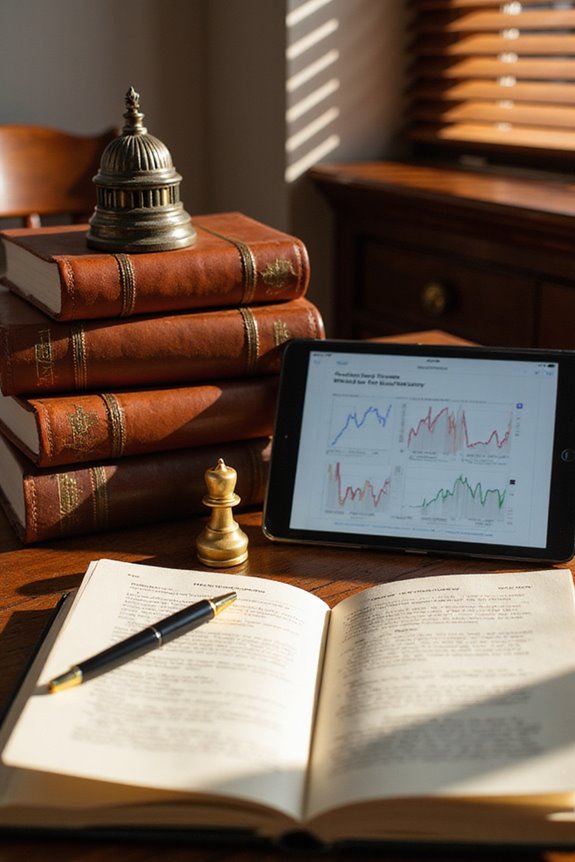In 2025, several recommended political books enrich our understanding of current governance and societal challenges. Key titles include:
- *Looking at Women Looking at War* by Victoria Amelina
- *Autocracy, Inc.* by Anne Applebaum
- *The Nazi Mind* by Laurence Rees
These works address themes like leadership adaptability, ethical governance, and the impacts of artificial intelligence. They help us understand political polarization and the rise of authoritarianism. There’s much more to explore within these narratives and their implications.
Key Takeaways
- *Looking at Women Looking at War: A War and Justice Diary* by Victoria Amelina explores the impact of war on women through a justice lens.
- *Broken Threads* by Mishal Husain intertwines personal family history with significant colonial shifts, offering a unique perspective on historical narratives.
- *Autocracy, Inc.* by Anne Applebaum analyzes the rise of global authoritarianism, making it a crucial read for understanding current political climates.
- *The Nazi Mind: Twelve Warnings From History* by Laurence Rees provides historical insights that resonate with contemporary political challenges and the implications of authoritarianism.
- *How to Save a Constitutional Democracy* by Ginsburg and Huq presents strategies to combat democratic erosion, essential for understanding the current political landscape.
Award-Winning Political Books of 2025
In 2025, several award-winning political books have emerged that reflect contemporary issues and historical narratives. Among these, *Looking at Women Looking at War: A War and Justice Diary* by Victoria Amelina stands out, offering a powerful political memoir that examines war’s impact on women through a justice lens. Other notable titles include *Broken Threads* by Mishal Husain, which intertwines family history with colonial shifts, and *Autocracy, Inc.* by Anne Applebaum, analyzing global authoritarianism. These political memoirs provide unique narrative depth, allowing readers to engage with broader historical upheavals through personal experiences. The recognition of these works indicates a growing appreciation for individual stories in political discourse, highlighting their significance in understanding complex political landscapes and systemic changes. This trend aligns with the focus on political relevance emphasized by the Orwell Prize for Political Writing, showcasing how personal narratives can illuminate larger societal issues. Furthermore, these narratives reflect the importance of historical context in connecting political ideas to their environments, allowing readers to grasp the evolution of thought in response to societal changes.
Emerging Themes in Political Leadership and Governance

Political memoirs like those recognized in 2025 highlight personal narratives that shape our understanding of broader governance issues.
Key themes in emerging political leadership include:
- Leadership Adaptability: Leaders must embrace continuous learning and agility to navigate unpredictable political landscapes effectively. This adaptability is essential in crises like pandemics or climate emergencies, as flexibility in leadership roles allows for more effective responses to diverse challenges.
- Ethical Governance: In an era of political polarization, ethical leadership fosters trust and accountability. Transparency and equitable resource sharing are vital for rebuilding public confidence.
- Inclusive Leadership: Encouraging diverse perspectives enhances problem-solving and boosts policy acceptance. Strong human connections through emotional intelligence improve collaboration and civic engagement.
- Sustainability Integration: Leaders must embed sustainability practices in governance, balancing economic growth with environmental responsibility to achieve long-term success.
These emerging themes are significant for fostering resilient political environments.
Political Implications of Artificial Intelligence

As we navigate the complexities of artificial intelligence (AI), it is crucial to recognize its profound political implications.
- AI Policy: The U.S. aims for dominance through substantial investments, framing AI as central to economic power and military strength. Recent investments include infrastructure like hydroelectric dams and data centers that are vital for supporting AI initiatives. Additionally, understanding the foundational concepts in political economy can provide insights into how these investments shape societal outcomes.
- Geopolitical Strategy: Tensions rise with China as the U.S. pursues unilateral measures, like export controls, risking global partnerships.
- Ethical Implications: The exclusion of diversity and misinformation in federal guidelines raises concerns over AI neutrality and societal impact.
- Workforce Impact: Investments in infrastructure are linked to workforce development, preparing Americans for an AI-driven economy.
- Regulatory Challenges: Deregulation efforts prioritize rapid AI deployment, often at the expense of precautionary measures.
- Economic Nationalism: The focus on “buy American” models reflects a desire to retain technological leadership domestically.
- Innovation Competition: Open-source initiatives encourage broader research opportunities, promoting innovation in AI technology.
Important Political Books Listed by Goodreads in 2025

2025 has seen a significant increase in political literature, reflecting diverse viewpoints and pressing global issues. Goodreads showcases notable titles that contribute to our understanding of political ideologies and civic engagement. Some key books include:
- *The Nazi Mind: Twelve Warnings From History* by Laurence Rees, rated 4.27, offers historical lessons relevant today.
- *Europe without Borders: A History* by Isaac Stanley-Becker explores challenges in European political integration.
Additionally, Goodreads lists 106 political books published in 2025, indicating a robust output of nonfiction and memoirs. These works emphasize personal perspectives on systemic issues and social change, highlighting the importance of civic engagement in contemporary discourse. By engaging with these texts, we can better navigate the complexities of modern politics. Furthermore, the enduring relevance of classics such as *The Prince* by Niccolò Machiavelli highlights the importance of historical political analysis in understanding today’s political landscape. Political books like *Democracy Awakening* serve as a reminder of the fragility of democracy and the continuous need for informed civic participation.
Democracy and Civic Life in 2025 Reading Lists

Understanding democracy and civic life requires examining the literature that shapes our perspectives and actions. In 2025, recommended readings will focus on civic literature that encourages participatory democracy. Here are some key themes we should explore:
- Civic Engagement Trends: Understand the recent stability in civic participation, especially among various demographics. JavaScript is disabled can hinder access to important online resources for civic engagement. Political internships can also provide valuable networking opportunities that help improve civic engagement.
- Youth Involvement: Examine how literature addresses the high engagement levels of youth aged 14-17 and the barriers young adults face in voting.
- Institutional Efforts: Investigate works highlighting research from organizations like the Center for Inclusive Democracy, which fosters social justice and electoral participation.
- Local Innovations: Read about successful models such as participatory budgeting and citizen deliberation forums that enhance local governance.
These topics will deepen our understanding of civic life in 2025.
Political Books for Engagement and Analysis in 2025
In light of the evolving political landscape, engaging with contemporary political literature is essential for our understanding and analysis of significant issues.
Key themes in 2025 political books include:
- Party Evolution: John H. Aldrich’s *Why Parties?* explores the shift of political parties and their impact on political identity.
- Social Justice: Danielle Allen emphasizes social participation as crucial to democracy, going beyond mere economic redistribution. Additionally, historical perspectives can provide valuable context for current social movements.
- Constitutional Resilience: *How to Save a Constitutional Democracy* by Ginsburg and Huq outlines strategies to tackle democratic challenges.
- Emotional Cleavages: Katherine J. Cramer’s work addresses political polarization’s roots in local emotional contexts.
- Historical Lessons: Laurence Rees’s *The Nazi Mind* provides insights into authoritarianism and extremism, pertinent for contemporary understanding. Additionally, understanding the emotional and fraught political dynamics can enhance our grasp of the complexities in rural political landscapes.
These works collectively enrich our analysis of the geopolitical landscape and the technological impact on social cohesion.
Key Insights From Nonfiction Political Narratives
Nonfiction political narratives provide valuable insights that deepen our understanding of contemporary political dynamics. They reveal essential aspects of government functions, highlighting how federal agencies protect society from complex risks. Through detailed explorations, these narratives demystify bureaucratic processes, emphasizing the foundational role of government in societal stability. Additionally, they underscore the importance of the Fifth Risk in illustrating how government inaction can lead to significant consequences for public welfare.
Moreover, themes of language decolonization emerge, showing how reclaiming indigenous languages can counter colonial legacies and empower marginalized communities. Furthermore, they address political polarization, emphasizing the need for curiosity and open dialogues to bridge divides.
The Role of Political Memoirs in Contemporary Discourse
Political memoirs play a considerable role in contemporary discourse by personalizing political history and offering unique insights into the lives of influential figures.
- They provide intimate glimpses into the experiences of politicians, revealing behind-the-scenes decision-making processes and motivations.
- Memoirs humanize abstract political events, fostering empathy and deeper public engagement.
- They often serve as corrective narratives, exposing discrepancies in official accounts and shaping public memory.
- The memoir impact extends to public opinion, as they can mobilize support or discredit opponents.
- In the digital age, accessibility enhances their influence, with platforms amplifying discussion and critique.
- Ultimately, the narrative authenticity of memoirs contributes considerably to our understanding of political culture and history, as they often reflect the historical contexts that shape societal structures.
Analyzing Authoritarianism and Global Governance Trends
How do we make sense of the rising tide of authoritarianism affecting global governance?
- Autocracies now outnumber democracies, with 91 countries under authoritarian rule.
- Nearly 40% of the global population lives in regions experiencing autocratization.
- Authoritarian strategies, such as media censorship and election interference, undermine democratic institutions and the rule of law.
- The United States faces rapid autocratization, with significant expansions of executive power and weakened checks on authority. The U.S. is one of the countries experiencing a shift towards autocratization.]
- This trend complicates global governance, impacting cooperation on issues like climate change and security.
- Furthermore, the erosion of freedoms globally diminishes the legitimacy of democratic frameworks, weakening international collaboration.
As we explore these dynamics, understanding their implications for global governance has never been more vital.
Frequently Asked Questions
How Do I Choose a Political Book That Suits My Interests?
When choosing a political book, we should consider our reading preferences and explore various political genres. Identifying themes that resonate with us will help narrow down our options and enhance our understanding of the subject.
Are There Any Political Books Specifically Focused on Climate Change?
Like a rising tide, climate activism is shaping environmental policy today. We can explore numerous political books that investigate climate change, offering insights into the complex interplay between our actions and the planet’s future.
What Are Some Notable Political Book Awards Besides the Orwell Prize?
When we look at political book awards, several remarkable options emerge beyond the Orwell Prize. These awards offer literary recognition for diverse contributions, celebrating works that explore political themes, biography, and international affairs.
Can Fiction Be Considered a Form of Political Literature?
Absolutely, we believe fiction can embody political literature. Through narrative influence and political symbolism, stories critique ideologies and illuminate societal issues, urging us to reflect on our world and consider alternative futures.
How Can I Engage With Authors of Political Books?
Like adventurers seeking treasure, we can engage with authors of political books by attending book signings, asking thoughtful questions, and using social media for direct interactions. Let’s plunge into meaningful conversations and enrich our understanding together!







